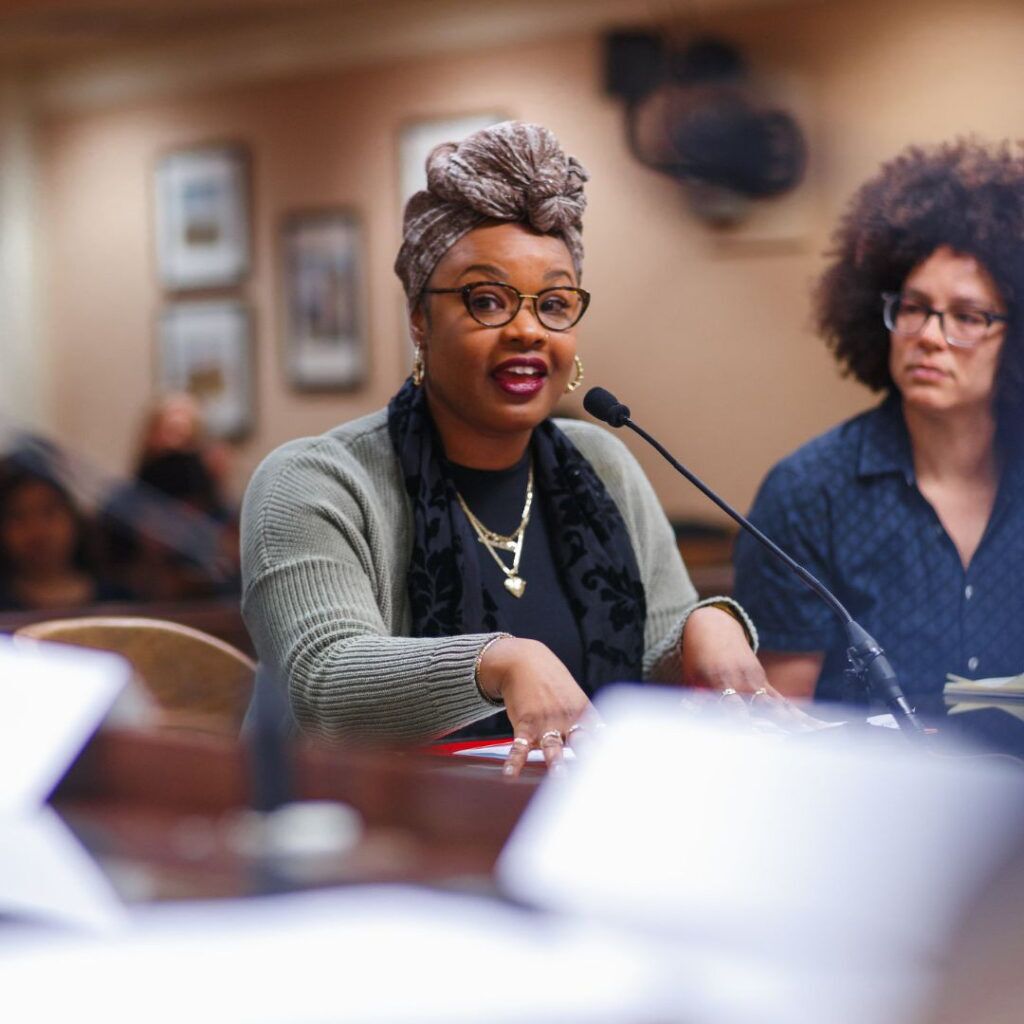
‘Remember the Ladies’: Attacks on Gender Equity Remain a Core Feature of Surging Authoritarianism
June 4, 2025
Trump Wants to Cut Tribal College Funding by Nearly 90%, Putting Them at Risk of Closing
June 4, 2025Kyren Lacy was a 6-foot-2 Southeastern Conference football player with a broad, if often absent, smile, a love for Buffalo Wild Wings and lemonade.
Some sports analysts even predicted that the Louisiana State University senior might go to a National Football League team as early as the second round of the draft this year.
Instead, Lacy died by suicide at 24 and was buried on the final day of the NFL draft. The reason why a young person would end their life was, for a few weeks, the subject of rampant speculation, mostly on social media, websites, and podcasts that cater to Black audiences and the sports obsessed.
Lacy had talked with friends for years about wanting into the NFL and the league pay that would eliminate his family’s financial worries, friends said. Then, in his final months, a tangle of events appeared to endanger that.
Speculation about the reasons Lacy ended his life, experts say, is common but not productive or sensitive to family members left behind. Also, there is rarely a single reason, said Janelle R. Goodwill, who has spent the past decade studying Black mental health and suicide prevention.
“People aren’t experiencing just one thing in a vacuum,” Goodwill said.
Across the population, the list of experiences and conditions that put people at greater risk of suicide is long but for young adults also includes impulsivity — a hallmark of the still developing human brain — and access to guns. In 2023, 55% of all suicides involved a firearm.
The uncertainty about what led Lacy to end his life in many ways reflects a growing phenomenon. In the past five years, Black boys and young men are increasingly dying by suicide. During that time, Black male death by suicide grew almost 22%, the second-largest suicide rate increase in the country.
Although researchers have struggled to pinpoint a reason for the increase, some of their findings suggest that for Black men and boys, concerns and stressors related to their futures, difficulties expressing distress and seeking help; narrow, even dehumanizing notions of masculinity, life meaning and success all may play some role. A 2023 study published in the Journal of Racial and Ethnic Health Disparities examined why Black adults age 18 to 30 have considered suicide. The most common reasons subjects reported varied by gender. Black men most frequently reported feeling hopeless about the future.
“It didn’t specify the source of hopelessness,” said Goodwill, a psychologist at the University of Chicago whose research focuses on the mental health of Black Americans, suicide prevention and mental health promotion. “But that is what I am focusing on now, trying to really understand.”
“What happened?” to Kyren Lacy

In his final season, Lacy tied for the SEC lead for most touchdowns by a receiver. Off the field, Lacy had two younger brothers, a mother, a girlfriend, and a Dodge Charger for which he often expressed love. And when he graduated from LSU in December with a degree in sport management, he posed for all the usual cap and gown pictures with each of his parents.
But, the final months of Lacy’s life were, objectively, challenging.
On Dec. 17, two days before graduation, Lacy was involved in a fatal car crash in Lafourche Parish, Louisiana. It took the life of Herman Hall, 78. Police said that Lacy had been speeding and crossed the centerline in a no-passing zone, causing other vehicles to crash, then failed to stop or render aid.
Lacy turned himself in to authorities on Jan. 12. He was arrested; booked on charges that included negligent homicide, felony hit-and-run and reckless operation of a vehicle in connection with the December crash; then released on $151,000 bond. Lacy’s lawyers disputed state police allegations that Lacy had caused the crash and failed to stop, insisting that both would be disproven in court.
Some LSU fans defended Lacy on social media as an innocent man or a 24-year-old who made a terrible mistake. Others described Lacy as an entitled killer and prison bound.
By February, the NFL revoked Lacy’s invitation to the NFL scouting combine, a 4-day event that allows NFL scouts to evaluate draft prospects’ skills. On March 26, Lacy participated in LSU’s Pro Day, where NFL staff observe players in action and the details of their performance and body are posted online for all to see.
On April 12 in Houston, where Lacy’s mother lives, Lacy got into an argument with a relative, according to the Harris County Sheriff’s Office. The argument escalated then moved outside where police said Lacy fired a weapon into the ground then drove off.
Worried, the relative called the police. Harris County officials described briefly following Lacy in what was not a high speed chase. Then Lacy’s car crashed. Inside, officers found Lacy with a fatal gunshot wound.
A hearing in his negligent homicide case was scheduled for the following week.
Lacy’s parents, girlfriend, coaches, lawyers and agent did not respond to requests for comment. Several have issued statements, including Lacy’s father, Kenny Lacy.
“Young parents, start talking to your kids at a very early age and make sure they are confident and comfortable confiding in you,” the elder Lacy wrote on Facebook the day after his son died. “Don’t be cool with ‘I’m Alright, or I’m good’ when you know deep down something isn’t right. Mental Health is real, and for the most part, it’s invisible, don’t ignore the signs, even if they may seem small.”
Black deaths undercounted, mischaracterized
It’s an alarming warning, much like the nation’s suicide data. Perhaps even more alarming: death by suicide is often undercounted or mischaracterized.
When Michael Curtis, a California native, moved to Georgia for graduate school, he found himself near a large number of rural communities with significant Black populations. Curtis and his research collaborators found that in these rural places, 1 in 3 Black men had recently experienced suicidal thoughts.

Growing up in rural communities with large Black populations today often means living in a community where all sorts of resources — including jobs and opportunities — are scarce, Curtis said. In these environments, it can be difficult to have healthy, trusting relationships of any kind, the study found.
By young adulthood, that mistrust can lead to feelings of isolation, which can prompt thoughts of suicide. And those who face more adverse childhood experiences than others were most likely to struggle, said Curtis, who is today a therapist and assistant professor at the University of Minnesota’s College of Education and Human Development.
The communities Curtis researched are much like Lacy’s hometown, Thibodaux, Louisiana, population 15,626, where the U.S. Census Bureau estimated in 2023 that 22% live in poverty.
In Curtis’ practice — he specializes in treating boys and young men, many of them Black — there is another issue that often arises. It, too, echoes in what is known about Lacy’s life.
“A lot of them are being told that their bodies — either through sports or through manual labor — are the only things that they have to offer,” Curtis said. “For many men who seem to have a talent for sports, from near birth, they’re being told that they are going to be professional athletes one day.”
Curtis treated one young man who had made it to the NFL but played a year before an injury forced him out. The man had pivoted into mentoring and coaching, and was distressed by the number of parents describing their 8-year-olds as destined for professional sports and a means to escape poverty or simply retire. Others are surrounded by people who only want to talk to them about their performance or a statistically unlikely pro sports career that, if it happens, is usually over by the time they’re 35.
Top-level athletes face pressure
Inside the world of Division I college sports, student athletes also face tremendous amounts of pressure to perform and demands on their time and bodies to practice, travel and play.
There is pressure to say and do things that appeal to fans and coaches who control their scholarships, any possible future in pro sports and, now, companies and advertisers who control access to name, image and likeness (commonly known as NIL) dollars. The latter gives student athletes the possibility of collecting a fraction of the billions made from college sports but, thus far, only a few have managed substantial income, said N. Jeremi Duru, a lawyer and professor at American University’s Washington College of law and a leading expert in legal matters in sports.
Some students, particularly student athletes of color, also face a complicated mix of admiration, jealousy, bigotry, and constant high performance expectations. In a December 2023 survey of 23,272 student athletes, the National Collegiate Athletic Association found that the share who reported feeling anxious, sad, or overwhelmed had improved since 2020, but indicators of student athlete distress remained “relatively high.” The highest rates of mental health struggle were reported by athletes of color, women, and LGBTQ student athletes.
Read More: Racism Pervades College Sports. It’s Taking an Alarming Toll on Athletes
On April 12, NFL wide receiver Malik Nabers was napping when a stream of buzzing sounds from his silenced phone notifications woke him, Nabers recounted on a sports podcast.
The texts were notes of condolence. Lacy was dead.
On YouTube: LSU Teammate Kyren Lacy hypes up Jayden Daniels and Malik Nabers after being drafted in Round 1
Nabers, drafted by the New York Giants in 2024, and Lacy were both sons of Louisiana and raised primarily by their mothers. While they were teammates at LSU, the two often worked out together and remained good friends.
Lacy was going through a tough time. Nabers knew that. But 10 hours before his death, Lacy had seemed OK.
“This was like the first person close to me that I’ve lost,” Nabers said on the podcast.
If you are facing mental health struggles, emotional distress, alcohol or drug use concerns, dial 988. Counselors are available free of charge, nationwide, 24 hours a day, seven days a week, 365 days a year.
Great Job Janell Ross & the Team @ Capital B News Source link for sharing this story.








